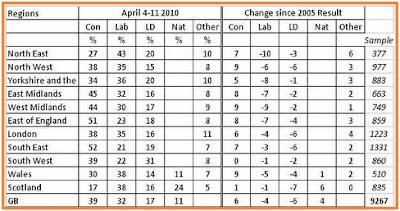One of the more pleasant things about not being a parliamentary candidate or member of Party staff in this election, unlike in the last three, is that I'm more free to say when I think we are making the wrong strategic calls.
In the case of our reaction to the recent boost for the Lib
Dems, I don't even have to write anything new as what I wrote in February in reaction to Peter
Hain's olive branch to the Lib
Dems is still pertinent.
Let's be clear: I am in favour of a fairer voting system that gives the parties seats in proportion to their share of the votes. In the event of a hung parliament I am in favour of trying to find common ground with the Lib
Dems to keep the Tories out of power - even though participation in a coalition or pact might not be in Labour's partisan interest (the partisan thing to do in a hung parliament is to be the only major party in opposition, then capitalise on the others' problems in government), the fragility of the economic recovery means we may need to work with the Lib
Dems to stop the Tories trashing the economy.
But these are matters for after the election. Before the election we have to maximise the Labour vote and number of Labour seats against all comers, including the Lib
Dems.
For now, they are our electoral enemies in a three-cornered fight. We have to present voters with a clear reason to vote not just "anti-Tory" but "pro-Labour".
The Lib Dems know this. They are not trying to reciprocate our overtures. They are trying to permanently destroy us. It's as though confronted by an axe-wielding assassin we react by trying to give them a big hug.
Here's what I wrote back in February:
"Peter
Hain has said in today's Guardian that "the new development in British politics is the emerging common ground" between Labour and the Lib
Dems:
http://www.guardian.co.uk/commentisfree/2010/feb/25/be-lib-dem-vote-labour.
Whilst I applaud his efforts to garner tactical votes from Lib Dem voters in Labour vs Tory seats, he couldn't be more wrong in his analysis of the Lib
Dems' positioning.
In fact, the Lib
Dems are remarkably close in tone to the Tories, with "Orange Book" free-marketeers very much in the driving seat.
Hain's claim that "we share common ground on the fundamentals of economic strategy" is nonsense given
Clegg's stated support for "savage cuts".
Hain is right to say that "Millions see themselves, not as dyed-in-the-wool Labour supporters, but as progressives who may also vote Lib Dem or Green or, in Wales, Plaid
Cymru."
But he is wrong to suggest that the way you get those people to vote Labour is to indulge in "me-
tooism", making out that all party allegiances on the centre-left are interchangeable and never laying a glove on the parties he names.
In fact, we need to be educating those voters that although superficially progressive, the Lib
Dems, Greens and
Nats are in fact the opposite. The Lib
Dems are the Tories' "mini-me", in coalition with them in twice as many hung councils as they are with Labour, and far more likely to prop up a Cameron government than a Labour one. The Greens are a party that has no connection to working class values or needs whatsoever, and want to destroy the economic growth and revitalised manufacturing that working class communities need. The
SNP and Plaid are nationalists whose ideology is the antithesis of progressive internationalism and would see England left to perpetual Tory rule.
We need to be highlighting the perils of letting the Tories in through the back door by voting for the Lib
Dems and minor parties, not
cosying up to them.We need to destroy the myth that the Lib
Dems are somehow progressive and work to get a situation where Labour is the only rational voting choice for people who consider themselves on the progressive left.
The route to mobilising the "natural anti-Tory majority"
Hain talks of doesn't start with giving the Lib
Dems a kiss of life with tactical voting, it starts by destroying them as an electoral force so that the division of the anti-Tory majority disappears because the party that caused that division is no longer a viable alternative to Labour.
As Harold Wilson said in his early '60s speech that famously began "the Labour Party is a moral crusade or it is nothing", we, Labour, were created for a reason - because the Liberals believed in political and religious freedom but did nothing to campaign for economic freedom.
We should be trying to purge our political system of this relic party from the
pre-universal suffrage days of 19
th century,which hasn't held power since 1922 and last time it did landed us in World War One.I have no idea why
Hain is trying to resuscitate Lib-
Labbery when it is anathema to almost every Labour activist and member. It is particularly damaging in seats where we are trying to build Labour from third place, as it gives the green light for a tactical squeeze on Labour there.
The job of Labour
MPs and
PPCs everywhere should be to promote Labour voting on its own merits, not as part of a mushy melange of indistinct vaguely or
faux progressive parties."





